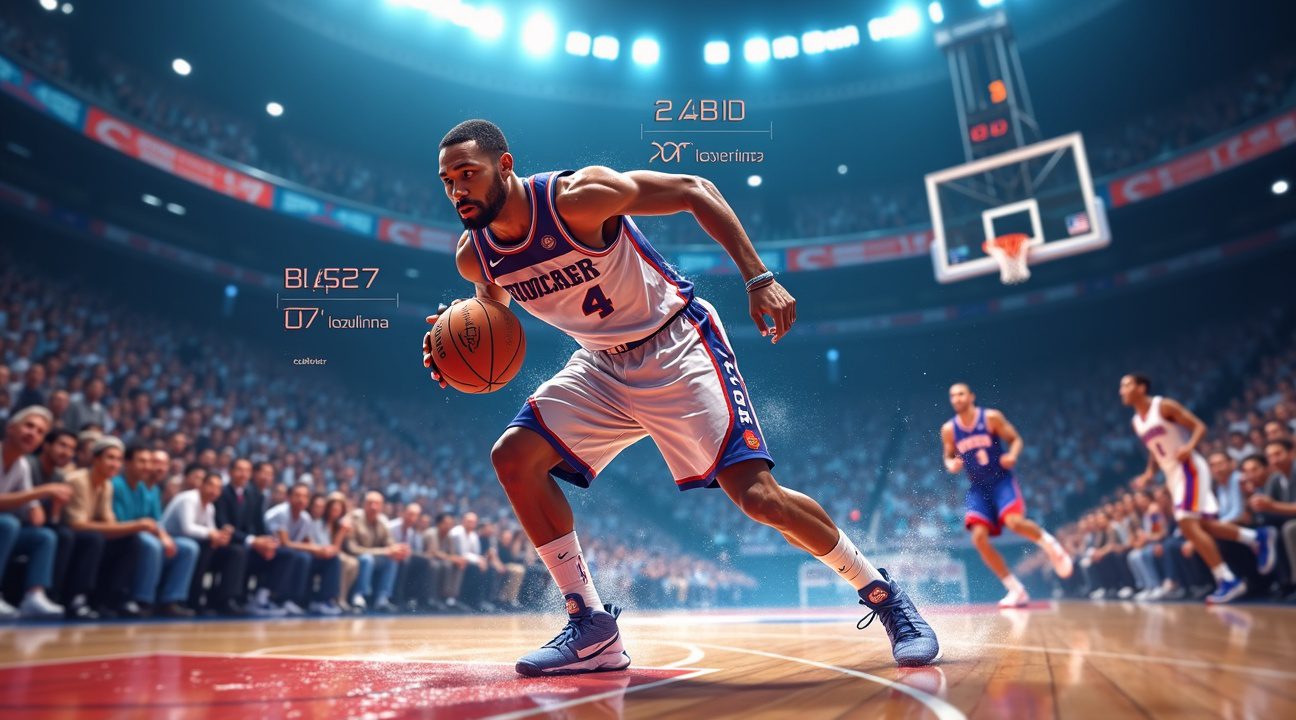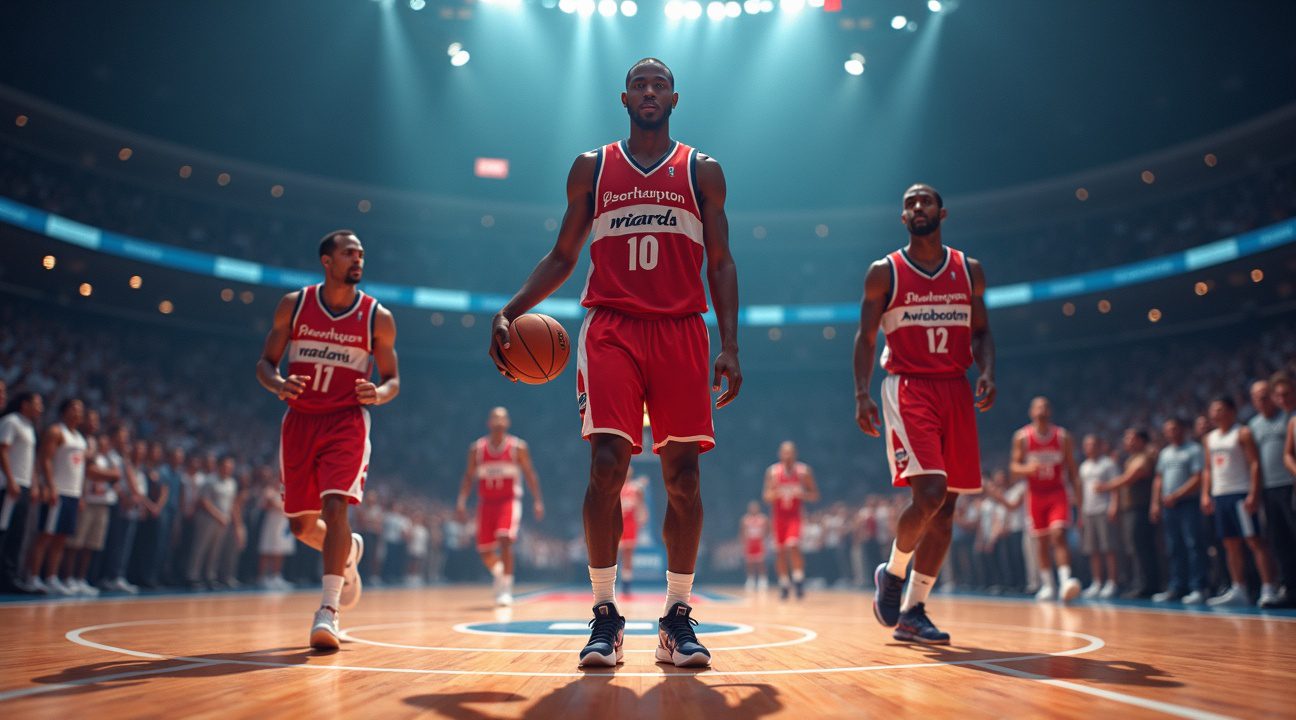John Wall officially announced his retirement from professional basketball on August 19, 2025, ending an 11-season NBA career that established him as one of the league’s premier point guards.
Career Overview
John Wall, the former No. 1 overall pick from the 2010 NBA Draft, made a lasting impact on the game with his speed, vision, and leadership. Known for his blazing-fast transition play and incredible passing ability, Wall quickly ascended to stardom, becoming a five-time NBA All-Star and one of the top point guards of his era.
Statistical Legacy
Over the course of 647 regular-season games, Wall posted impressive all-around numbers that underscored his versatility and basketball IQ. His career averages include:
- 18.7 points per game
- 8.9 assists per game
- 4.2 rebounds per game
- 1.6 steals per game
Accolades and Achievements
- Five-time NBA All-Star
- All-NBA Third Team selection (2016–17)
- NBA All-Defensive Second Team (2014–15)
These honors reflect not only his individual talent but his strong contributions on both ends of the court.
Teams and Tenure
- Washington Wizards: Wall spent the bulk of his career — nine seasons — with the Wizards, where he became the face of the franchise and led the team to multiple playoff appearances.
- Houston Rockets: After his tenure in Washington, Wall joined Houston, where injuries hampered his ability to make a consistent impact.
- Los Angeles Clippers: Wall concluded his career with a brief stint in Los Angeles, offering veteran leadership to a deep playoff-contending roster.
Impact of Injuries
Wall’s later seasons were significantly affected by injuries. Over the final four years of his career, he never appeared in more than 41 games in a single season. A combination of Achilles, knee, and other lower-body issues ultimately influenced his decision to retire.
Legacy and Retrospective
John Wall’s retirement adds to the growing list of veteran NBA players stepping away, marking the close of a dynamic chapter in point guard play. Known for his charisma, community involvement, and electric style, Wall’s presence will be sorely missed on the court but celebrated off it.
Five-Time All-Star John Wall Officially Hangs Up His Jersey After 11 NBA Seasons
John Wall announced his retirement from professional basketball on August 19, 2025, bringing an end to an 11-season NBA career that saw him establish himself as one of the league’s premier point guards. The former No. 1 overall pick in the 2010 NBA Draft by the Washington Wizards officially closed the chapter on a journey that spanned three franchises and earned him five All-Star selections.
Wall’s career took him through three different organizations, each representing a distinct phase of his professional development. He spent the majority of his career with the Washington Wizards, the team that drafted him straight out of the University of Kentucky. His tenure in the nation’s capital established him as a cornerstone player and fan favorite, wearing jersey number 2 throughout his time there.
Career Journey Across Three Franchises
The dynamic point guard’s later career included stops with two additional teams that showcased his adaptability and veteran leadership. His brief stint with the Houston Rockets saw him switch to jersey number 1, representing a fresh start during a challenging period in his career. Wall concluded his playing days with the Los Angeles Clippers during the 2022-23 season, donning number 11 for what would become his final campaign.
Wall’s retirement adds another significant name to the growing list of recent NBA departures. His decision follows a pattern of veteran players choosing to step away from the game, similar to recent announcements from other notable figures. The league has seen several high-profile retirements lately, including Carmelo Anthony’s official retirement, marking the end of an era for players from that generation.
The point guard’s impact on the game extended beyond individual statistics, as he consistently demonstrated leadership qualities that made him valuable to each organization he represented. His ability to facilitate offense and create opportunities for teammates defined much of his playing style throughout his 11-season career.
Wall’s decision to retire comes after missing significant time due to injuries in his later years, a factor that likely influenced his choice to step away from professional basketball. The timing of his announcement allows him to control the narrative of his departure while reflecting on a career that included multiple playoff appearances and individual accolades.
The basketball community now recognizes Wall’s contributions to the sport as his playing career officially concludes. His retirement marks the end of a distinctive era in NBA point guard play, characterized by explosive athleticism and court vision that defined his approach to the position.

Career Numbers Tell the Story of an Elite Point Guard
John Wall’s statistical legacy showcases a player who consistently delivered elite production throughout his 11-year NBA career. His career averages of 18.7 points, 8.9 assists, 4.2 rebounds, and 1.6 steals per game demonstrate the complete skill set that made him one of the premier point guards of his era. Wall shot 43.0% from the field and 32.2% from three-point range, numbers that reflect both his aggressive scoring mentality and areas where he continued developing his game.
Regular Season Dominance
Across 647 regular-season games, Wall accumulated impressive career totals that place him among the notable players in NBA history. He scored 12,088 points while dishing out 5,735 assists, establishing himself as a dual threat who could score at will or set up teammates for easy baskets. His defensive contributions included 2,704 rebounds, 1,045 steals, and 439 blocks, proving his impact extended far beyond offensive production.
Wall’s ability to impact multiple statistical categories simultaneously separated him from many of his contemporaries. His 1.6 steals per game average demonstrates the anticipation and quick hands that made him dangerous in passing lanes, while his rebounding numbers show he wasn’t afraid to mix it up in traffic despite his 6’4″ frame.
Playoff Excellence and Historical Rankings
Wall’s postseason performances often elevated his already impressive regular-season numbers. In 37 playoff games, he averaged 21.9 points, 9.8 assists, 4.3 rebounds, and 1.7 steals per game, proving he could raise his level when the stakes increased. These playoff averages actually exceeded his regular-season production in every major category, highlighting his ability to perform under pressure.
His place in NBA history becomes clearer when examining specific statistical rankings:
- 288th all-time in three-pointers attempted with 2,021 attempts
- 220th all-time in free throws made with 2,691 successful attempts
These rankings reflect both his willingness to take outside shots and his aggressive style that frequently drew contact at the rim.
The numbers paint a picture of a player who could dominate games in multiple ways. Wall’s career statistics place him in conversations with other elite point guards of his generation, and his consistent production over more than a decade demonstrates remarkable durability and skill. While injuries ultimately shortened his career, his statistical achievements cement his status as one of the most dynamic floor generals of the 2010s era.

Accolades and Recognition Throughout His NBA Journey
John Wall’s career achievements tell the story of a player who consistently performed at the highest level throughout his time in the league. His five NBA All-Star selections stand as a testament to his sustained excellence, though he participated in four All-Star Games due to injury. These appearances placed him among the elite point guards of his generation and showcased his ability to compete with the best players in basketball.
The 2016-17 season marked the pinnacle of Wall’s individual recognition when he earned All-NBA Third Team honors. This achievement represented the highest individual accolade of his career and came during one of his most productive seasons. His defensive prowess didn’t go unnoticed either, as evidenced by his All-Defensive Second Team selection in 2014-15, highlighting his two-way impact on the court.
Wall’s impressive start to his professional career earned him NBA All-Rookie First Team honors in 2010-11, setting the tone for what would become a distinguished career. That same rookie season saw him finish second in Rookie of the Year voting behind Blake Griffin, a remarkably close race that demonstrated his immediate impact in the league. His early success continued with Eastern Conference Rookie of the Month awards from January through April 2011, showing his consistent growth throughout his debut season.
Notable Achievements and Milestones
- Won the Slam Dunk Championship during the 2013-14 season, showcasing his athleticism and creativity
- Earned NBA Rookie Game MVP honors during All-Star Weekend in 2010-11
- Became the third youngest player in NBA history to record a triple-double
- Registered multiple triple-doubles throughout his career, demonstrating his all-around capabilities
Wall’s triple-double achievements deserve special recognition, as reaching that milestone at such a young age placed him in exclusive company with some of basketball’s greatest talents. His ability to stuff the stat sheet with points, assists, and rebounds illustrated the complete skill set that made him such a valuable player throughout his career.
The variety of Wall’s accomplishments speaks to his versatility as a player. From his explosive dunking ability that earned him a championship to his playmaking skills that generated countless assists, he proved capable of impacting games in multiple ways. His recognition spanned both ends of the court, with his defensive selection proving he wasn’t just an offensive weapon.
These accolades position Wall among the notable players who have made their mark on the league, similar to other stars who have earned recognition throughout their careers. The breadth of his achievements – from individual awards to team success – demonstrates why his retirement marks the end of an era for a player who consistently delivered memorable performances. Just as we’ve seen with other retiring stars, Wall’s legacy will be remembered through these tangible accomplishments that defined his 11-season journey in professional basketball.
Wall’s recognition throughout his career reflects not just personal success but his ability to elevate his teams and compete at the highest level consistently. His five All-Star selections spread across multiple seasons show he maintained elite performance over an extended period, while his rookie achievements demonstrated he was ready to compete from day one.

From Wizards Franchise Face to Multi-Team Veteran
Wall’s NBA journey began with the Washington Wizards, who selected him as the first overall pick in the 2010 draft. For nine seasons, he served as the cornerstone of the franchise, establishing himself as one of the league’s premier point guards. His explosive speed and court vision made him an instant fan favorite in Washington, where he transformed from a promising rookie into a franchise icon.
Building a Legacy in Washington
During his tenure with the Wizards, Wall consistently elevated his team’s performance on both ends of the court. His exceptional playmaking abilities and tenacious defensive style helped guide Washington to four playoff appearances, including two memorable runs to the Eastern Conference Semifinals. These postseason achievements marked some of the franchise’s most successful years in recent memory, with Wall orchestrating the offense while anchoring the team’s defensive schemes.
Wall’s impact extended beyond individual statistics, as he became the undisputed leader of a franchise hungry for sustained success. His ability to create scoring opportunities for teammates while maintaining strong defensive pressure made him invaluable during crucial playoff moments. The Wizards relied heavily on his leadership and basketball intelligence throughout their competitive seasons.
The Final Chapters Across Multiple Teams
In 2020, Wall’s Washington chapter concluded with a blockbuster trade that sent him to the Houston Rockets in exchange for Russell Westbrook. This move represented a significant shift for both franchises, as each sought to revitalize their roster construction. Wall’s time in Houston proved challenging due to injury concerns and team dynamics, but he demonstrated his resilience and professional approach throughout the transition.
His final NBA season brought him to the Los Angeles Clippers in 2022, where he signed as a veteran presence capable of contributing meaningful minutes. With the Clippers, Wall embraced a different role than he’d previously known, adapting his game to complement an already talented roster. His experience and basketball IQ provided valuable depth for a team with championship aspirations.
The league has witnessed numerous high-profile retirements recently, including Carmelo Anthony’s official retirement, highlighting how veteran players continue making difficult decisions about their careers. Wall’s retirement follows this trend of established stars choosing to step away from professional basketball after accomplished careers.
Throughout his 11-season career, Wall accumulated impressive statistics while maintaining his reputation as a dynamic two-way player. His combination of speed, court awareness, and defensive intensity made him a constant threat during his prime years. Teams consistently had to game-plan specifically for his unique skill set, particularly his ability to push the pace and create fast-break opportunities.
Wall’s professional approach remained consistent regardless of which uniform he wore. His dedication to improving his teammates’ performance never wavered, whether he was leading a young Wizards squad or providing veteran leadership with the Clippers. This consistency in character and work ethic earned him respect throughout the league.
The basketball community recognizes Wall’s contributions to the sport extend beyond his on-court achievements. His leadership qualities and professional demeanor set an example for younger players entering the league. Like other retiring veterans, his departure marks the end of an era for fans who followed his career from its promising beginning to its dignified conclusion.
Wall’s retirement represents the conclusion of a career defined by explosive athleticism, sharp basketball instincts, and unwavering competitiveness. His journey from franchise cornerstone to veteran contributor demonstrates the evolving nature of professional basketball careers and the different roles players can embrace as their careers progress.

Injuries Derail Final Chapters of Promising Career
Physical ailments transformed John Wall’s final NBA chapters from what could have been a triumphant conclusion into a frustrating battle against his own body. The injuries that plagued his later years weren’t just minor setbacks – they were career-altering obstacles that ultimately influenced his decision to step away from professional basketball.
The Cascade of Physical Setbacks
Wall’s decline began with a series of devastating injuries that robbed him of both explosiveness and reliability. Multiple knee injuries struck first, attacking the very foundation of his game – his legendary speed and cutting ability. These weren’t isolated incidents but recurring problems that required extensive rehabilitation periods and fundamentally changed how he approached the game.
Abdominal injuries compounded his troubles, creating a perfect storm of physical limitations that no amount of determination could overcome. The combination proved particularly cruel for a player whose entire identity was built on dynamic movement and court vision. Each injury seemed to trigger another, creating a domino effect that left Wall constantly fighting to return to form.
The statistics tell a sobering story of decline. During his final four seasons, Wall never appeared in more than 41 games in any single campaign. This dramatic drop in availability wasn’t just about missed games – it represented missed opportunities to build chemistry with teammates, establish rhythm, and maintain the conditioning necessary for elite performance.
His tenure with the Houston Rockets exemplified these struggles. Extended absences became the norm rather than the exception, leaving both Wall and the organization in a constant state of uncertainty. The Rockets, who had acquired him with hopes of adding veteran leadership and playmaking, instead found themselves managing a player whose availability remained perpetually in question.
The Los Angeles Clippers experience followed a similar pattern. Despite the organization’s reputation for excellent medical staff and player development, even they couldn’t solve Wall’s persistent physical issues. His time in Los Angeles was marked by the same frustrating cycle of brief returns followed by extended absences that had defined his final years.
What made these injuries particularly devastating was their impact on Wall’s signature abilities. His explosive first step, which had terrorized defenders for over a decade, became a shadow of its former self. The knee problems sapped his vertical leap and lateral quickness, while abdominal issues affected his core stability and shooting mechanics.
Recovery periods stretched longer with each setback, a natural consequence of an aging body that had endured the rigors of elite basketball for more than a decade. Wall found himself spending more time in rehabilitation facilities than on practice courts, a reality that slowly but inevitably pointed toward retirement.
The psychological toll of these physical limitations cannot be understated. For a player who had built his reputation on being one of the fastest and most dynamic guards in league history, watching his body fail to respond as it once did created an internal struggle that went far beyond statistics and game appearances.
Unlike some veterans who can adapt their games to compensate for diminishing athleticism, Wall’s skill set was so closely tied to his physical gifts that the injuries essentially redefined what type of player he could be. The adjustment proved too significant to overcome, particularly when combined with the unpredictable nature of his various ailments.
These persistent health issues ultimately became the deciding factor in Wall’s retirement decision. Rather than continue fighting a losing battle against his own body, he chose to step away on his own terms. His experience serves as a reminder of how quickly careers can change direction, even for players who seemed destined for long, productive runs at the highest level.
The NBA has seen other stars face similar crossroads, with some managing to officially retire after successful adaptation periods, while others, like Wall, found the physical demands too great to sustain. His situation highlights the unforgiving nature of professional sports, where even the most talented athletes must eventually yield to the realities of physical limitations.

Wall’s Lasting Impact on the NBA and Washington Franchise
John Wall carved out a distinguished career that fundamentally changed how teams viewed the point guard position. His explosive first step and court vision set him apart from his contemporaries, establishing a blueprint for modern floor generals. I’ve watched Wall orchestrate fast breaks with surgical precision, turning defensive rebounds into scoring opportunities in mere seconds.
The Washington Wizards transformed from perennial strugglers to playoff contenders during Wall’s prime years. His leadership extended beyond statistics, as he became the face of a franchise desperately seeking relevance in the competitive Eastern Conference. Wall’s ability to elevate teammates around him created a winning culture that hadn’t existed in Washington for years.
A Draft Pick That Delivered on Promise
Wall’s pre-NBA accolades proved prophetic of his professional success. His NCAA John R. Wooden Award All-American Team honors demonstrated the elite talent that would translate seamlessly to the highest level. Unlike many top draft selections who struggle with expectations, Wall immediately validated his No. 1 overall selection with consistent excellence.
His athletic gifts were undeniable, but Wall’s basketball IQ separated him from other physically gifted guards. I observed how he could read defensive rotations and deliver passes that seemed impossible to casual observers. This combination of raw athleticism and refined skill made him one of the most complete point guards of his generation.
The ripple effects of Wall’s career extend beyond his individual achievements. His success paved the way for other athletic point guards to embrace their speed while developing their passing skills. Teams began prioritizing similar combinations of athleticism and court vision when evaluating draft prospects.
Wall’s injuries later in his career couldn’t diminish the foundation he built in Washington. The franchise’s identity shifted during his tenure, creating expectations for competitive basketball that persist today. His jersey retirement seems inevitable, cementing his status as the most impactful player in modern Wizards history.
The NBA will remember Wall as a player who maximized his physical gifts through intelligent play. His ability to control tempo while maintaining explosive speed influenced how coaches design offensive systems. Future point guards will study his film to understand how elite athleticism can coexist with cerebral playmaking.
Just as other stars have stepped away from the game, Wall’s retirement marks the end of an era for dynamic point guard play. His impact transcended statistics, reshaping both the Washington franchise and the broader understanding of what makes an elite floor general.

Sources:
LandOfBasketball: John Wall Profile and Basic Stats
CBS Sports: John Wall retires, former Wizards No. 1 pick, Kentucky basketball star ends pro career after 11 seasons
Wikipedia: John Wall
SportsForecaster: John Wall Stats, Profile, Bio, Analysis and More
ESPN: John Wall – Houston Rockets Point Guard
ESPN: John Wall Career Stats – NBA
LandOfBasketball: John Wall Career Stats: All-Time NBA Rankings


